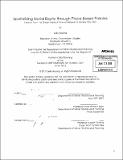Spatializing social equity through place-based policies : lessons from the Green Impact Zone of Missouri, in Kansas City, MO
Author(s)
Bozorg, Leila
DownloadFull printable version (6.665Mb)
Alternative title
Green Impact Zone of Missouri, in Kansas City, MO
Other Contributors
Massachusetts Institute of Technology. Dept. of Urban Studies and Planning.
Advisor
Anne Whiston Spirn.
Terms of use
Metadata
Show full item recordAbstract
The Kansas City Green Impact Zone of Missouri is a regionally administered, place-based initiative that emerged in direct response to the 2009 "federal moment" symbolized by the creation of the White House Office of Urban Affairs and the passing of the American Recovery and Reinvestment Act and the Livable Communities Act. The initiative aims to coordinate and concentrate new resources in a 150-block area that - once the target of formal disinvestment and segregation - is now home to some of Kansas City's poorest African American families. This thesis uses the deep-case study approach to examine how place-based programs can simultaneously promote the three Es of sustainability (equity, the environment, and the economy) and to understand the challenges to organizing and implementing such initiatives. The thesis first reviews the people vs. place debate in urban policy, and introduces into that debate literature on spatial justice and sustainable development, to claim a role for equity concerns in the current urban policy and planning agendas. To understand the context in which the Green Impact Zone operates and the source of the problems it hopes to address through place-based investment and programming, the thesis then describes the history of decisions, policies, and programs that created a racialized, inequitable, and unsustainable landscape in Kansas City. The thesis then describes the process of developing the Green Impact Zone initiative, evaluating the strengths of the model and the challenges it has experienced to date, to draw lessons and make recommendations at two scales. The thesis concludes by suggesting that to effectively promote sustainability in all its three Es (equity, environment, economy), Engagement must be considered as a fourth E.
Description
Thesis (M.C.P.)--Massachusetts Institute of Technology, Dept. of Urban Studies and Planning, 2010. Cataloged from PDF version of thesis. Includes bibliographical references (p. 80-85).
Date issued
2010Department
Massachusetts Institute of Technology. Department of Urban Studies and PlanningPublisher
Massachusetts Institute of Technology
Keywords
Urban Studies and Planning.